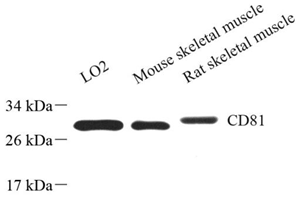| Reactivity: | H,M,R |
| Applications: | WB |
| Host Species: | Rabbit |
| Clonality: | Polyclonal |
| Full Name: | CD81 rabbit polyclonal antibody |
Gene Name: | CD81 antigen |
Synonyms: | 26 kDa cell surface protein TAPA-1, Target of the antiproliferative antibody 1, CD81, Tapa1 |
Immunogen: | KLH conjugated Synthetic peptide corresponding to Mouse CD81 |
Isotype: | IgG |
Purity: | Affinity purification |
Predicted MW. | 26 kDa |
Observed MW. | 30 kDa |
Uniprot ID: | P60033, P35762, Q62745 |
Applications
Applications | Species | Dilution | Positive tissue |
WB | Human, Mouse, Rat | 1: 500-1: 1000 | skeletal muscle |
Background
CD81 (TAPA-1, target of anti-proliferative antibody-1) is a member of the tetraspanin family, is expressed on virtually all nucleated cells, but above all on germinal center B cells. CD81 forms complexes with other tetraspanin proteins, integrins, coreceptors, MHC class I and II molecules, and influences adhesion, morphology, activation, proliferation and differentiation of B, T cells. In muscles, CD81 promotes cell fusion and myotube maintenance. CD81 has been also identified as a receptor for the hepatitis C virus. CD81 is a cell-surface proteins that are characterized by the presence of four hydrophobic domains. The proteins mediate signal transduction events that play a role in the regulation of cell development, activation, growth and motility.CD81 appears to promote muscle cell fusion and support myotube maintenance. Antibodies to CD81 have anti-proliferative effects on different lymphoid cell lines, particularly those derived from large cell lymphomas.
Images
|
|
Western blot analysis of CD81 (GB111073) at dilution of 1: 500 |
Storage
| Storage | Store at -20°C for one year. Avoid repeated freeze/ thaw cycles. |
| Storage Buffer | PBS with 0.02% sodium azide, 100 μg/ml BSA and 50% glycerol. |

